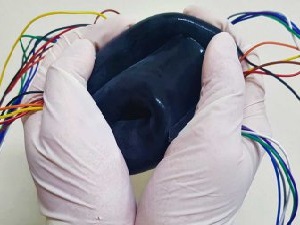



Date:25/07/18
 A keyboard that can be crumpled up and fits into a pocket has been developed by a team of scientists in South Korea.
A keyboard that can be crumpled up and fits into a pocket has been developed by a team of scientists in South Korea.
The researchers say their device is cheap to make and is flexible enough to be squashed up without causing damage.
In a study supported by the National Research Foundation of Korea, the team used a sensor sheet they had previously developed to build the keyboard.
The sheet, made of soft Ecoflex silicone rubber, contains carbon nanotubes that respond to touch by changing electrical resistance (the measure of the difficulty to pass an electric current through a conductor).
To create the keys, the team drew squares on the surface of the sheet for each letter, number or other character.
They then used an artificial neural network – a system modelled on the human brain – to train the keyboard to identify the letter or character based on the location and touch pressure and co-related that to changes in resistance on the keyboard.
The keyboard worked perfectly and outperformed all existing portable keypads in terms of functionality, flexibility, disposability and cost, the researchers said.
While bendable keyboards are already on the market, the researchers say they have limited flexibility, rigid push buttons, and can only withstand a slight amount of bending or rolling.
The research is published in the journal ACS Applied Materials & Interfaces.
This keyboard can be crumpled up and stuck into a pocket
 A keyboard that can be crumpled up and fits into a pocket has been developed by a team of scientists in South Korea.
A keyboard that can be crumpled up and fits into a pocket has been developed by a team of scientists in South Korea.The researchers say their device is cheap to make and is flexible enough to be squashed up without causing damage.
In a study supported by the National Research Foundation of Korea, the team used a sensor sheet they had previously developed to build the keyboard.
The sheet, made of soft Ecoflex silicone rubber, contains carbon nanotubes that respond to touch by changing electrical resistance (the measure of the difficulty to pass an electric current through a conductor).
To create the keys, the team drew squares on the surface of the sheet for each letter, number or other character.
They then used an artificial neural network – a system modelled on the human brain – to train the keyboard to identify the letter or character based on the location and touch pressure and co-related that to changes in resistance on the keyboard.
The keyboard worked perfectly and outperformed all existing portable keypads in terms of functionality, flexibility, disposability and cost, the researchers said.
While bendable keyboards are already on the market, the researchers say they have limited flexibility, rigid push buttons, and can only withstand a slight amount of bending or rolling.
The research is published in the journal ACS Applied Materials & Interfaces.
Views: 724
©ictnews.az. All rights reserved.Similar news
- The mobile sector continues its lead
- Facebook counted 600 million active users
- Cell phone testing laboratory is planned to be built in Azerbaijan
- Tablets and riders outfitted quickly with 3G/4G modems
- The number of digital TV channels will double to 24 units
- Tax proposal in China gets massive online feedback
- Malaysia to implement biometric system at all entry points
- Korea to build Green Technology Centre
- Cisco Poised to Help China Keep an Eye on Its Citizens
- 3G speed in Azerbaijan is higher than in UK
- Government of Canada Announces Investment in Green Innovation for Canada
- Electric cars in Azerbaijan
- Dominican Republic Govt Issues Cashless Benefits
- Spain raises €1.65bn from spectrum auction
- Camden Council boosts mobile security





















